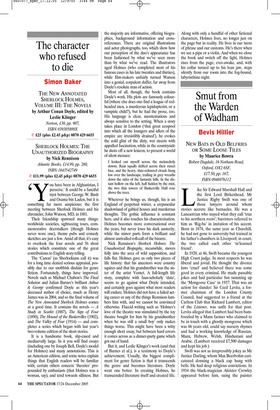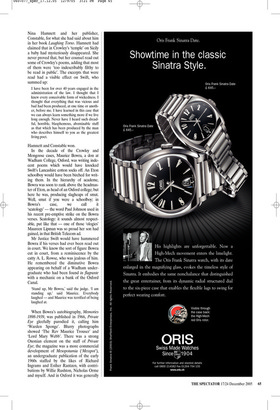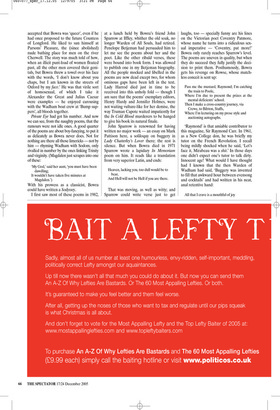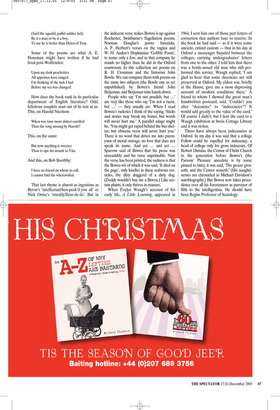Smut from the Warden of Wadham
Bevis Hillier
NEW BATS IN OLD BELFRIES OR SOME LOOSE TILES by Maurice Bowra Robert Dugdale, 16 Norham Road, Oxford, OX2 6SF, £17.50, pp. 167, ISBN 0946976112 Like Sir Edward Marshall Hall and the first Lord Birkenhead, Mr Justice Rigby Swift was one of those lawyers around whom stories accrete like barnacles. He was a Lancastrian who stayed what they call ‘true to his northern roots’; barristers referred to him as ‘Rig-ba’ in imitation of his accent. Born in 1874, the same year as Churchill, he had not gone to university but trained in his father’s chambers in Liverpool; in court, the two called each other ‘m’learned friend’.
In 1920, at 46, Swift became the youngest High Court judge. In most respects he was liberal and jovial. He thought the divorce laws ‘cruel’ and believed there was some good in every criminal. He made passable jokes and had particular fun summing up the ‘Mongoose Case’ in 1937. That was an action for slander: Sir Cecil Levita, a former chairman of the London County Council, had suggested to a friend at the Carlton Club that Richard Lambert, editor of the Listener, was unfit for that post. Levita alleged that Lambert had been bamboozled by a Manx farmer who claimed to be in touch with a ghostly mongoose which was 86 years old, could say nursery rhymes and had a working knowledge of Russian, Manx, Hebrew, Welsh, Hindustani and Arabic. (Lambert received £7,500 damages and kept his job.) Swift was not as irrepressibly jokey as Mr Justice Darling, whom Max Beerbohm caricatured donning a black cap hung with bells. He had deep religious convictions. In 1934 the black-magician Aleister Crowley appeared before him, suing the painter Nina Hamnett and her publisher, Constable, for what she had said about him in her book Laughing Torso. Hamnett had claimed that in Crowley’s ‘temple’ on Sicily a baby had mysteriously disappeared. She never proved that, but her counsel read out some of Crowley’s poems, adding that most of them were ‘too indescribably filthy to be read in public’. The excerpts that were read had a visible effect on Swift, who summed up:
I have been for over 40 years engaged in the administration of the law. I thought that I knew every conceivable form of wickedness. I thought that everything that was vicious and bad had been produced, at one time or another, before me. I have learned in this case that we can always learn something more if we live long enough. Never have I heard such dreadful, horrible, blasphemous, abominable stuff as that which has been produced by the man who describes himself to you as the greatest living poet.
Hamnett and Constable won.
In the decade of the Crowley and Mongoose cases, Maurice Bowra, a don at Wadham College, Oxford, was writing indecent poems which would have knocked Swift’s Lancashire cotton socks off. An Eton schoolboy would have been birched for writing them. In the hierarchy of academe, Bowra was soon to rank above the headmaster of Eton, as head of an Oxford college; but here he was, producing slagheaps of smut. Well, smut if you were a schoolboy; in Bowra’s case, we call it ‘scatology’ — the word Paul Johnson used in his recent pre-emptive strike on the Bowra verses. Scatology: it sounds almost respectable, put like that — one of those ‘ologies’ Maureen Lipman was so proud her son had gained, in that British Telecom ad.
Mr Justice Swift would have hammered Bowra if his verses had ever been read out in court. We know the sort of figure Bowra cut in court, from a reminiscence by the catty A. L. Rowse, who was jealous of him. He remembered the diminutive Bowra appearing on behalf of a Wadham undergraduate who had been found in flagrante with a mechanic on a bank of the Oxford Canal.
‘Stand up, Mr Bowra,’ said the judge. ‘I am standing up,’ said Maurice. Everybody laughed — and Maurice was terrified of being laughed at.
When Bowra’s autobiography, Memories 1898-1939, was published in 1966, Private Eye gleefully parodied it, calling him ‘Warden Sponge’. Blurry photographs showed ‘The Rev Maurice Trouser’ and ‘Lord Mary Webb’. There was a strong Oxonian element on the staff of Private Eye; the magazine was a more commercial development of Mesopotamia (‘Messpot’), an undergraduate publication of the early 1960s staffed by the likes of Richard Ingrams and Esther Rantzen, with contributions by Willie Rushton, Nicholas Orme and myself. And in Oxford it was generally accepted that Bowra was ‘queer’, even if he had once proposed to the future Countess of Longford. He liked to sun himself at Parsons’ Pleasure, the (since abolished) nude bathing place for men on the river Cherwell. The story was much told of how, when an illicit punt-load of women floated past, all the other men covered their genitals, but Bowra threw a towel over his face with the words, ‘I don’t know about you chaps, but I am known in the streets of Oxford by my face.’ He was that virile sort of homosexual, of which I take it Alexander the Great and Julius Caesar were examples — he enjoyed carousing with the Wadham boat crew at ‘Bump suppers’, all bloods together.
Private Eye had got his number. And now we can see, from the naughty poems, that the rumours were not idle ones. A good quarter of the poems are about boy-fancying, to put it as delicately as Bowra never does. Not for nothing are there all those limericks — not by him — rhyming Wadham with Sodom, only rivalled in number by the ones linking Trinity and virginity. (Magdalen just scrapes into one of these:
‘My God,’ said her aunt, ‘you must have been dawdling; It wouldn’t have taken five minutes at Magdalen.’)
With his prowess as a classicist, Bowra could have written a Sodyssey.
I first saw most of these poems in 1982, at a lunch held by Bowra’s friend John Sparrow at Iffley, whither the old soak, no longer Warden of All Souls, had retired. Penelope Betjeman had persuaded him to let me see the poems about her and the poet. Like the other ribald verses, these were bound into book form. I was allowed to publish one in my Betjeman biography. All the people mocked and libelled in the poems are now dead except two, for whom ominous gaps have been left in the text. Lady Harrod died just in time to be received into this unholy fold — though I am sure that the poems’ exemplary editors, Henry Hardy and Jennifer Holmes, were not waiting vulture-like for her demise, the way Truman Capote waited impatiently for the In Cold Blood murderers to be hanged to give his book its natural finale.
John Sparrow is renowned for having written no major work — an essay on Mark Pattison here, a soliloquy on buggery in Lady Chatterley’s Lover there; the rest is silence. But when Bowra died in 1971 Sparrow wrote a lapidary In Memoriam poem on him. It reads like a translation from very superior Latin, and ends:
Heaven, lacking you, too dull would be to bear, And Hell will not be Hell if you are there.
That was moving, as well as witty; and Sparrow could write verse just to get laughs, too — specially funny are his lines on the Victorian poet Coventry Patmore, whose name he turns into a ridiculous sexual imperative — ‘Coventry, pat more!’ Bowra only rarely reaches Sparrow’s level. The poems are uneven in quality, but when they do succeed they fully justify the decision to print them. Posthumously, Bowra gets his revenge on Rowse, whose matchless conceit is sent up:
Pass me the mustard, Raymond; I’m catching the train to Poole, Where I’m due to present the prizes at the mental deficients’ school.
Then I make a cross-country journey, via Crewe, to Bilston, Staffs, Where I’m lecturing on my prose style and auctioning autographs.
‘Raymond’ is that amiable contributor to this magazine, Sir Raymond Carr. In 1961, as a New College don, he was briefly my tutor on the French Revolution. I recall being mildly shocked when he said, ‘Let’s face it, Mirabeau was a shit.’ In those days one didn’t expect one’s tutor to talk dirty. Innocent age! What would I have thought had I known that the then Warden of Wadham had said, ‘Buggery was invented to fill that awkward hour between evensong and cocktails’ and had written in his neat, anal retentive hand:
All that I crave is a mouthful of joy (Said the squalid, pallid soldier lad); Be it a man or be it a boy, To me he is better than Helen of Troy.
Some of the poems are what A. E. Housman might have written if he had lived post-Wolfenden:
Upon my dark proclivities All appetites have ranged. I’m thinking of the lads I had Before my sex was changed.
How does the book rank in its particular department of English literature? Odd, felicitous couplets start out of its text at us. This, on Harold Nicolson:
When was tune more dulcet carolled Than the song unsung by Harold?
This, on the same:
But now anything is sweeter Than to ope his mouth to Vita.
And this, on Bob Boothby:
I have no friend on whom to call, I cannot find the wherewithal.
That last rhyme is almost as ingenious as Byron’s ‘intellectual/hen-peck’d you all’ or Nick Orme’s ‘sturdily/fleur-de-lis’. But in the indecent verse stakes Bowra is up against Rochester, Swinburne’s flagellation poems, Norman Douglas’s porno limericks, A. P. Herbert’s verses on the vagina and W. H. Auden’s Hopkinsian ‘Gobble Poem’, to name only a few; and in that company he stands no higher than he did in the Oxford courtroom. In this collection are poems on R. H. Crossman and the historian John Bowle. We can compare them with poems on the same two subjects (the Bowle one as yet unpublished) by Bowra’s friend John Betjeman, and Betjeman wins hands down.
People who say ‘I’m not prudish, but ...’ are very like those who say ‘I’m not a racist, but ...’ — they usually are. When I read Bowra’s ruderies I think of the saying, ‘Sticks and stones may break my bones, but words will never hurt me.’ A parallel adage might be, ‘You might get raped behind the bus shelter, but obscene verse will never hurt you.’ There is no word that drives me into paroxysms of moral outrage, no love that dare not speak its name. And yet ... and yet ... Sparrow said of Bowra that his prose was unreadable and his verse unprintable. Now the verse has been printed, the sadness is that the Bowra wit of which it was said, ‘It died on the page’, only kindles in these scabrous versicles, the dirty doggerel of a dirty dog. (Daddy wouldn’t buy me a Bowra.) Like certain plants, it only thrives in manure.
When Evelyn Waugh’s account of his early life, A Little Learning, appeared in 1964, I sent him one of those pert letters of correction that authors hate to receive. In the book he had said — as if it were some ancient, extinct custom — that in his day at Oxford a messenger bicycled between the colleges, carrying undergraduates’ letters from one to the other. I told him that there was a bottle-nosed old man who still performed this service. Waugh replied, ‘I am glad to hear that some decencies are still preserved at Oxford. My eldest son, briefly at the House, gave me a most depressing account of modern conditions there.’ A friend to whom I showed the great man’s handwritten postcard, said, ‘Couldn’t you alter “decencies” to “indecencies”? It would add greatly to the value of the card.’ Of course I didn’t; but I lent the card to a Waugh exhibition at Swiss Cottage Library and it was stolen.
There have always been indecencies at Oxford. In my day it was said that a college Fellow could be expelled for indecency, a head of college only for gross indecency. Of Robert Dundas, the Censor of Christ Church in the generation before Bowra’s (the Parsons’ Pleasure anecdote is by some pinned to him), it was said, ‘The grocer grosseth; and the Censor senseth.’ (His naughtinesses are chronicled in Michael Davidson’s autobiography.) But Bowra now takes precedence over all his forerunners as purveyor of filth to the intelligentsia. He should have been Regius Professor of Scatology.





















































































 Previous page
Previous page